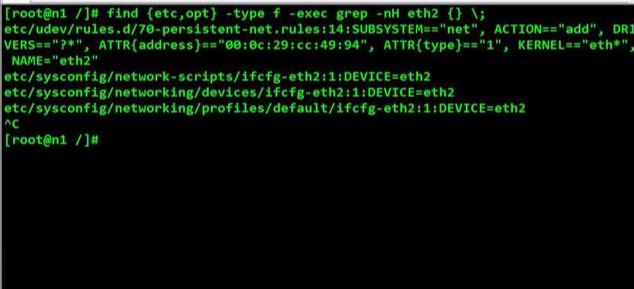

¹ Note test -e tells you if there's a file which may be a directory or whatever. I think this would be unnecessarily complicated.
EXEC GREP WILDCARD CODE
Directories could appear multiple times, newlines in pathnames would require non-portable code (starting from -print0). to execute at the same time without having at least the same priority. name '*.log' … -printĪnd to parse its output to isolate directory names, finally to use xargs with du. Importantly, the wildcard names in input and output must be named identically. Remember -exec is also a test, so it affects if -print (or -exec du … or whatever you put there) is performed.Īnother approach may be to let find itself find matching files with find. If there is no match then the pattern will stay literal, test will fail and the whole shell will exit with failure ( exit 1). Not-yet-tested matching files (if any) will not be tested in vain, this saves time. This works by returning success ( exit 0) from the inner shell as soon as test confirms existence of some matching file¹. Replace -print with -exec du … if you wish. There's no need for inner bash, sh should be faster. type d -exec sh -c 'įor f in "$1/"*.log do test -e "$f" & exit 0 done exit 1 The following code will find directories with *.log files: find. C with only grep user311346 at 17:13 1 Wildcard with -include'.C' option, user311346, thanks to Lekensteyn.
EXEC GREP WILDCARD HOW TO
Not sure how to do my search recursively in file patterns like. Note also that these wildcards can be used in other commands as well like in cp for example.

grep -E fatalerrorcriticalfailurewarning file1,2.log. The wildcard isnt necessary to be at the end so flickerflys answer can be simplified to.
The problem is *.log may expand to more than one word (if there are many matching files) and this case will break the test invocation. 8,115 10 33 35 grep -RInThe -or operator either find ‘.c’ or ‘.asm’ file. The -type f option force find to only search files and not directories. The parentheses must be escaped with a backslash, ( and ), to prevent them from being interpreted as special shell characters. This way it's a wildcard in the inner shell (but not in the outer shell, it's properly single-quoted there). Fig.01: Linux find command exclude files command.

The main "fix" however is in not quoting the asterisk in the shell code. See What is the second sh in sh -c 'some shell code' sh?. For a list of trademarks of The Linux Foundation, please see our Trademark Usage page.With find … -exec test -e '' \ txtxargs grep -l 'directory2'xargs grep -l 'director圓'. The Linux Foundation has registered trademarks and uses trademarks. Its not very pretty but you can chain the grep together: grep -l 'directory1'. © Prometheus Authors 2014-2023 | Documentation Distributed under CC-BY-4.0 Please help improve it by filing issues or pull requests.
EXEC GREP WILDCARD FULL
Most likely, you have a directory (or multiple directories) full of files that you need to search. have the same value per index to execute queries more efficiently. If you’re only searching a couple of files, you probably wouldn’t have wound up reading this guide. The wildcard type is optimized for fields with large values or high cardinality. The above code is supposed to extract all numeric data ending with any seven digits after the dot, but it does not work. When I changed this code using wildcard as follows: grep '.
EXEC GREP WILDCARD SERIES
Type ( proc) like this: topk(3, sum by (app, proc) (rate(instance_cpu_time_ns)))Īssuming this metric contains one time series per running instance, you couldĬount the number of running instances per application like this: count by (app) (instance_cpu_time_ns) Also, don’t forget that wildcards are permitted and can help make grep more efficient: grep -l example. I extract the all numeric data ending with.

we could get the top 3 CPU users grouped by application ( app) and process than end the find command with the -print option, you can use the -exec option. Job and handler labels: http_requests_total is grep's wildcard character, like the question mark () in the shell. You should get a nice (perhaps empty) list with all the. the character is the representation of the pipe basically directs the output of the ls command as input for grep. Return all time series with the metric http_requests_total and the given On the contrary, if you want to filter a list unless some entries, put it in the parameter -v: ls grep -v crontab DumpSite.sh nagios-3.0.6 xmpppy xymon-4.3.0-beta2. Return all time series with the metric http_requests_total: http_requests_total


 0 kommentar(er)
0 kommentar(er)
